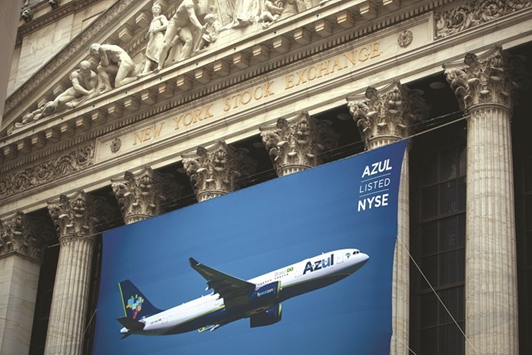Political fallout from Brazil’s ever-widening corruption scandals is weighing on the investment-banking business: Mergers and acquisitions are slowing down and issuers are speeding up stock and bond deals to avoid the impact of the 2018 presidential election.
“Election years can be volatile for markets and this coming year will be particularly so,” said Jose Olympio Pereira, chief executive officer for Credit Suisse Group in Brazil. “If I was an issuer, I would try to raise all the capital I could this year, as early as possible, and I would not leave anything to next year,” said Pereira, whose firm is the nation’s top-ranked M&A adviser in 2017, according to data compiled by Bloomberg.
Companies are taking his advice. Total equity offerings reached 15.4bn reais ($4.9bn) so far this year in Brazil, already surpassing the total for all of last year, while international bond issuance increased almost sixfold, to $9.95bn. Announced deals in the merger market, where investors have a longer-term perspective, fell to $844.3mn in March from $5.66bn in February, marking the first time since January 2015 a monthly figure fell below the $1bn mark.
“Companies are moving as fast as possible to take advantage of the window, even if the debt or equity markets might not be at their peak,” Patricia Moraes, head of investment and corporate banking for JPMorgan Chase & Co in Brazil, said in an interview. “Firms have been paying too much interest in past years and some sectors need to recapitalise, refinance debt, so it makes sense to raise equity.”
Airline Azul sold shares last month with demand outpacing the amount offered. Azul jumped as much as 9.4% in its trading debut on April 11 after pulling off an initial public offering that had been delayed several times, including a last-minute interruption by Brazil’s securities regulator. The Brazilian airline started by JetBlue Airways Corp founder David Neeleman and its shareholders raised $572mn.
“Larger equity deals, raising about 2bn reais or more, and from better-known companies are more easily sold than smaller ones because international investors demand liquidity,” said Andre Rosenblit, head of equities for Banco Santander Brasil, the No 1 equity underwriter for Brazil this year, according to data compiled by Bloomberg.
This year’s boom in IPOs, which more than quintupled from the same period last year, isn’t being slowed by new developments in the so-called Carwash probe, in which 83 new investigations targeting politicians have been announced. Even though the revelations could delay pension-reform votes seen as key to improving Brazil’s fiscal accounts, the outlook for final approval remains intact, according to the political-analysis group Eurasia.
“The Brazil pipeline is robust,” Martin Marron, JPMorgan’s CEO for Latin America, said March 31 at the Inter-American Development Bank’s annual meeting. “It’s a country that was away from the market for 2 1/2 years, there was an accumulation in investment-banking needs, and we’re already starting to see a change.”
That expectation is also benefiting the debt markets, where “there is a big wall of maturities in 2018 and 2019 for Brazilian Corps,” Moraes at JPMorgan said. “Since last year, we’ve been seeing people anticipating the rollover.”
Brazilian companies have $13.1bn in external debt maturing in 2018 and an additional $16.9bn in 2019, according to data compiled by Bloomberg.
If short-term debt and equity markets are still showing strength, longer-term investments and merger deals are starting to slow because “the more lasting impact of the ongoing Carwash scandal will be felt in the 2018 election, where anti-establishment sentiment is likely to dominate voter choices,” Eurasia said.
Ricardo Lacerda, CEO of the investment bank BR Partners, said strategic and financial investors “want to see a stable electoral cycle before committing to invest in Brazil,” so the current political risk is already blocking some deals.
Politics is having a similar market impact in Chile and Argentina, where longer-term investors are watching upcoming elections, said Marco de Carvalho, head of M&A for Latin America at Barclays. “Hopefully over time we’ll see more of continuation in policies, and there will be less of a wait-and-see approach by investors,” he said in an interview at the World Economic Forum in Buenos Aires.

Azul signage is displayed outside of the New York Stock Exchange during the company’s initial public offering. Azul sold shares last month with demand outpacing the amount offered. Azul jumped as much as 9.4% in its trading debut on April 11 after pulling off an initial public offering that had been delayed several times.
